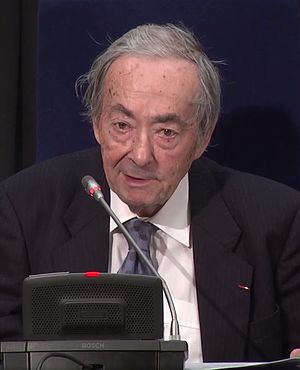
“[The] most important tribute any human being can pay to a poem or a piece of prose he or she really loves is to learn it by heart. Not by brain, by heart; the expression is vital.”
Share this quote:
“Language can only deal meaningfully with a special, restricted segment of reality. The rest, and it is presumably the much larger part, is silence.”
Share this quote:
“To shoot a man because one disagrees with his interpretation of Darwin or Hegel is a sinister tribute to the supremacy of ideas in human affairs -- but a tribute nevertheless.”
Share this quote:
“Pornographers subvert this last, vital privacy; they do our imagining for us. They take away the words that were of the night and shout them over the roof-tops, making them hollow.”
Share this quote:
“We know that a man can read Goethe or Rilke in the evening, that he can play Bach and Schubert, and go to his days work at Auschwitz in the morning.”
Share this quote:
“It is not the literal past that rules us, save, possibly, in a biological sense. It is images of the past. Each new historical era mirrors itself in the picture and active mythology of its past or of a past borrowed from other cultures. It tests its sense of identity, of regress or new achievement against that past.”
Share this quote:
“The journalistic vision sharpens to the point of maximum impact every event, every individual and social configuration; but the honing is uniform.”
Share this quote:
“To many men... the miasma of peace seems more suffocating than the bracing air of war.”
Share this quote:
“Men are accomplices to that which leaves them indifferent.”
Share this quote:
“Words that are saturated with lies or atrocity, do not easily resume life.”
Share this quote:
when a language dies, a way of understanding the world dies with it, a way of looking at the world.
Share this quote:
We speak in (rich) monotones. Our poetry is haunted by the music it has left behind. Orpheus shrinks to a poet when he looks back, with the impatience of reason, on a music stronger than death.
Share this quote:
Books - the best antidote against the marsh-gas of boredom and vacuity
Share this quote:
What you dont know by heart you havent really loved deeply enough
Share this quote:
The inception of human consciousness, the genesis of awareness, must have entailed prolonged condensations around intractable nodes of wonder and terror, at the discriminations to be made between the self and the other, between being and non-being (the discovery of the scandal of death).
Share this quote:
No phonetic sign, except at a rudimentary, strictly speaking pre-linguistic level of vocal imitation, has any substantive relation or contiguity to that which it is conventionally and temporally held to designate.
Share this quote:
When a language dies, a possible world dies with it.
Share this quote:
Language can only deal meaningfully with a special, restricted segment of reality. The rest, and it is presumably the much larger part, is silence.
Share this quote:
There would be no history as we know it, no religion, no metaphysics or aesthetics as we have lived them, without an initial act of trust, of confiding, more fundamental, more axiomatic by far than any “social contract” or covenant with the postulate of the divine. This instauration of trust, this entrance of man into the city of man, is that between word and world.
Share this quote:
the calling of the teacher. There is no craft more privileged. To awaken in another human being powers, dreams beyond one’s own; to induce in others a love for that which one loves; to make of one’s inward present their future; that is a threefold adventure like no other.
Share this quote: